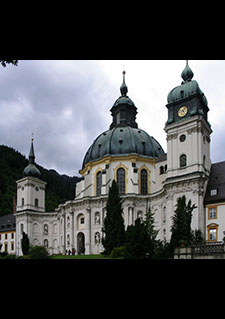The Ethics of Political Resistance
Bonhoeffer’s Prussian regional church was not allowed to know anything concrete about his active involvement in the conspiracy against Hitler. Since he was forbidden to work publicly as a pastor, the Council of Brethren granted him official leave for scholarly pursuits and thus enabled him to go underground in resistance activity inconspicuously. Many were aware that Bonhoeffer planned a large volume of “Ethics”. His work on this theological magnum opus, the surviving fragment, has a special connection with the Benedictine monastery in Ettal (photo).
Leaving his Munich center of operations, Bonhoeffer spent the winter of 1940-41 there in order to prepare for his new mission, meet with first contacts and reflect theologically on what was coming. He shared contemplative life of the monks who read his “Cost of Discipleship” aloud at meals. Even a meeting with the Jesuit priest Rupert Mayer took place.
In his “Ethics”, Bonhoeffer discarded the action-guiding category of the good conscience. He was convinced that following one’s conscience was ultimately only self-defense in order to be in a justifiable position in the end. Rather than ethics aiming for one’s own goodness however, Christian must also allow for the possibility that one even ends up as a sinner.
Bonhoeffer spoke of a responsible assumption of guilt: A Christian must be ready to take on guilt if God demands it. Fully aware of the potential consequences, Bonhoeffer had thus selected the path of active political resistance.

